WHO: Working more than 55 hours per week is a serious health hazard
- Normal Liver Cells Found to Promote Cancer Metastasis to the Liver
- Nearly 80% Complete Remission: Breakthrough in ADC Anti-Tumor Treatment
- Vaccination Against Common Diseases May Prevent Dementia!
- New Alzheimer’s Disease (AD) Diagnosis and Staging Criteria
- Breakthrough in Alzheimer’s Disease: New Nasal Spray Halts Cognitive Decline by Targeting Toxic Protein
- Can the Tap Water at the Paris Olympics be Drunk Directly?
WHO: Working more than 55 hours per week is a serious health hazard
WHO: Working more than 55 hours per week is a serious health hazard. Every year 750,000 people die from overtime work. WHO research reveals that working more than 55 hours a week is a serious health hazard.
With the acceleration of the pace of life in modern society, the pressure of life, study and work is increasing, and the involution is becoming more and more serious. The 40-hour normal working time has almost become a luxury. Working overtime is commonplace for many people. In recent years, some domestic Internet companies have even regarded overtime as a culture, and 996 has even been described as a kind of “blessing”.
Long working hours are obviously harmful to health, and news about the sudden death of young people caused by long hours of overtime is not uncommon. What kind of damage does long hours of overtime do to the body?
On May 17, 2021, the World Health Organization (WHO) and the International Labor Organization (ILO) published a research paper titled: “Global, regional, and national burdens of ischemic heart disease and stroke attributable to exposure to long working hours for 194 countries, 2000–2016: A systematic analysis from the WHO/ILO Joint Estimates of the Work-related Burden of Disease and Injury”.
This is the world’s first survey report on the health effects of long-term work teams. The study provides sufficient evidence that people who work more than 55 hours a week suffer from heart disease compared with the normal working hours of 35-40 hours a week. The risk of illness and stroke is higher.
This study shows that in 2016, 488 million people worldwide worked at least 55 hours a week, accounting for 8.9% of the global workforce. And this proportion is increasing rapidly. From 2000 to 2016, the proportion of people working at least 55 hours a week increased by 9%.
In 2016, an estimated 745,000 deaths were attributed to ischemic heart disease and stroke caused by long hours of work or overtime, of which stroke accounted for 53% (398,000) and ischemic heart disease accounted for 47% (347,000) ). Between 2000 and 2016, the number of deaths from ischemic heart disease caused by long hours of work increased by 42%, and the number of deaths from stroke increased by 19%.
For the majority of 996 workers, the working week is 72 hours, which is 17 hours longer than the long-term work referred to by the WHO. Therefore, what netizens say 996=ICU is not only a sad sentence. Self-deprecating, but becoming a helpless reality.
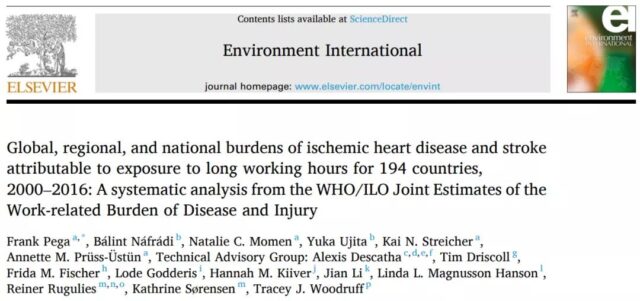
The World Health Organization (WHO) and the International Labour Organization (ILO) organized a team of experts to examine the working hours of 194 countries/regions and the ischemia by gender and age in 183 countries/regions in 2000, 2010 and 2016. A comparative analysis of the attributable burden of sexual heart disease and stroke.
The analysis results show that in 2016, there were 488 million people (8.9% of the global labor force) working long hours (≥55 hours/week) in the world. 745,000 deaths due to ischemic heart disease (347,000) and stroke (398,000), and 23.3 million disability-adjusted life-years (DALY) can be attributed to these long hours of work.
Disability-adjusted life year (DALY) refers to the total healthy life years lost from illness to death, including two parts: years of life lost due to early death and years of healthy life lost due to disability.
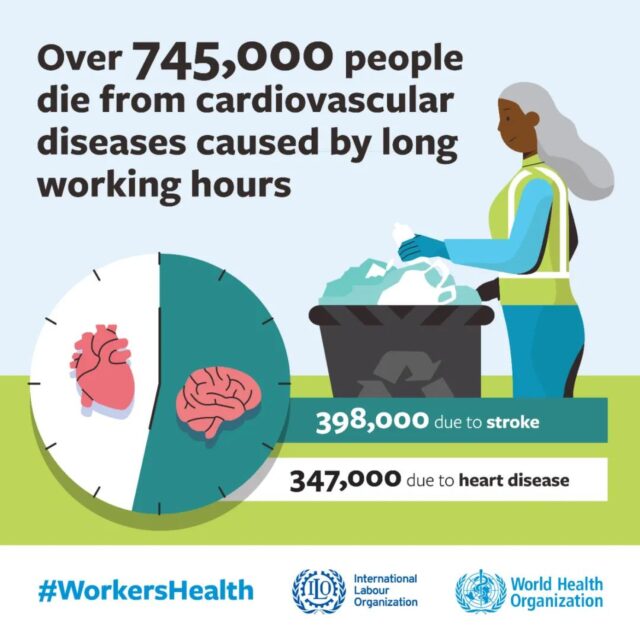
The most serious situation in these regions and countries
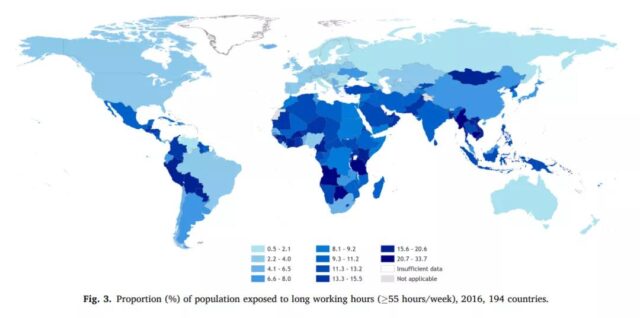
In 2016, Southeast Asia had the highest proportion of people working 55 hours or more a week at 11.7%, followed by Africa and the Eastern Mediterranean at 11.4%, and Europe had the lowest at 3.5%.
Over time, from 2000 to 2016, the proportion of workers working 55 hours or more per week increased the most in the Western Pacific region, while Africa experienced the largest decrease.
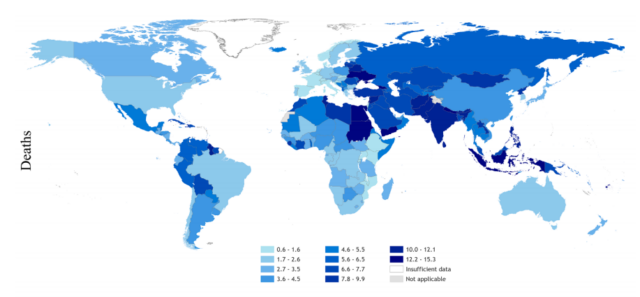
Among all regions in 2016, Southeast Asia was the most serious, with the highest number of deaths from ischemic heart disease and stroke due to long working hours, both at 160,000, with the largest increase, while Europe had the lowest.
Specific to the country, Egypt, Lebanon, and Ukraine have the highest heart disease death rates due to long hours of work, with approximately 15 deaths per 100,000 people. France, Rwanda and Kenya are the lowest, with less than 1 case per 100,000 people.
North Korea is the country with the highest stroke mortality rate due to long hours of work, with 28.1 deaths per 100,000 people. Countries such as France, Norway, and Switzerland are the lowest, with less than 1 case per 100,000 people.
Men are more affected
Among those who work 55 hours or more a week, men and early middle-aged adults account for the majority. From 2000 to 2016, the proportion of men working 55 hours or more per week increased, while the proportion of women was relatively stable.

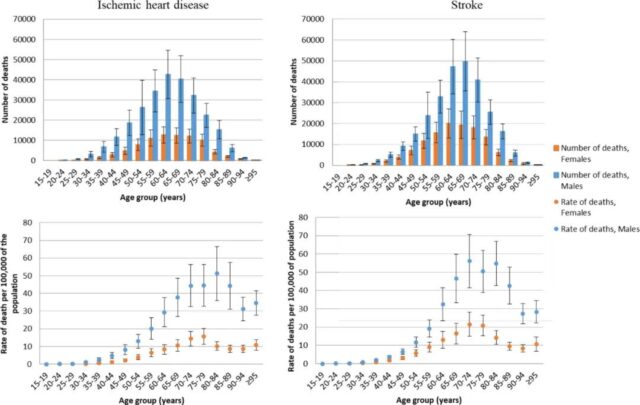
In the disease burden of ischemic heart disease and stroke caused by long working hours, the burden of men is greater than that of women, and the number of related deaths and mortality increases with age. Whether from the perspective of absolute death toll or relative mortality, men and the elderly (60-74 years old) bear a greater burden of ischemic heart disease and stroke due to long hours of work.
Why does long working hours cause heart disease and stroke?
Studies have shown that working long hours may lead to heart disease and stroke through two main “paths”, which can lead to death.
The first way: the physiological response caused by stress. Working for a long time will continue to activate the autonomic nervous system and the immune system, which will cause related stress responses and release excessive stress hormones (such as epinephrine, norepinephrine and Cortisol). This triggers a response in the cardiovascular system and causes tissue disease.
The first way: the behavioral way of coping with stress. Many people cope with the pressure of working for a long time and will choose some harmful coping styles, including smoking, drinking, unhealthy diet, lack of exercise, lack of sleep, etc. These are all ischemia Known risk factors for sexual heart disease and stroke.
According to this large-scale survey and research, the World Health Organization (WHO) and the International Labour Organization (ILO) estimate that long hours of work (≥55 hours/week) are very common worldwide, accounting for about the world’s labor force. 9%, however, long hours of work can lead to a huge burden of ischemic heart disease and stroke. In order to protect people’s health and spiritual safety, the government, employers, and workers should work together to adopt better ways to reduce long-term work patterns that can seriously harm health.
(source:internet, reference only)
Disclaimer of medicaltrend.org
Important Note: The information provided is for informational purposes only and should not be considered as medical advice.



